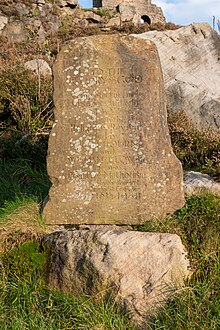William Clowes (1780–1851) was one of the founders of Primitive Methodism.
Biography

William Clowes was born at Burslem, Staffordshire, on 12 March 1780, son of Samuel Clowes, potter, and of Ann, daughter of Aaron Wedgwood, grandson of Gilbert Wedgwood. He was employed during his early years as a working potter.
For many years Clowes led a dissipated life. He was a fine dancer and aspired to be the premier dancer in the kingdom. On 20 January 1805 he was converted. He soon established a prayer meeting in his own house and led a Wesleyan Methodist class.
Clowes attended the first Primitive Methodist camp-meeting ever held in England, at Mow Cop near Harriseahead on 31 May 1807. He was joined in this meeting by Hugh and James Bourne and others. In October 1808 he preached his trial sermon with the Wesleyan Methodists and was duly appointed a local preacher; but, continuing to associate with the Bournes and to attend camp-meetings, his name was omitted from the preachers' plan in June 1810, and in September his quarterly ticket as a member of the society was withheld from him.
After this he made common cause with the Bournes and James Crawfoot. With them he founded the Primitive Methodist Connexion, and became one of the best-known preachers of the new society. He worked mainly in northern England, as well as in London and Cornwall, were most successful in adding members to the church. In 1819 he introduced Primitive Methodism to Hull. He was assisted by Sarah and John Kirkland, who were both experienced preachers, until John's health gave way and Sarah was pregnant. They returned to Derbyshire in May 1820. [1]
In 1821 his evangelizing in Leeds was so successful that Ann Carr, Sarah Ecland and Martha Williams were sent from Hull to join him. These new arrivals caused some problems as they were both popular and undisciplined moving from circuit to circuit as the will took them. [2]
Death and legacy
On 10 June 1842 he was placed on the superannuation fund. His journal and his life story was published in 1844. [3] He still continued his labours until a day or two before he died from paralysis, at Hull on 2 March 1851.
One of his daughters married her cousin, John Wedgwood, an Anglican priest.
References
- ^ "DMBI: A Dictionary of Methodism in Britain and Ireland". dmbi.online. Retrieved 2023-03-28.
- ^ Jennifer Lloyd (19 July 2013). Women and the Shaping of British Methodism: Persistent Preachers, 1807-1907. Manchester University Press. pp. 102, 127–. ISBN 978-1-84779-323-2.
- ^ Clowes, William (1844). The Journals of William Clowes: A Primitive Methodist Preacher, Containing Chronicles of Events Relative to His Unregenerate State, His Conversion to God, His Call to the Ministry, the Commencement and Progress of the Primitive Methodist Connexion, and to His Itinerant Labours Therein from the Year 1810 to that of 1838. Hallam and Holliday.
- Clowes, William (1844), The Journals of William Clowes, London: Hallam and Holliday
- William Clowes collection The John Rylands University Library
- Chisholm, Hugh, ed. (1911), , Encyclopædia Britannica, vol. 22 (11th ed.), Cambridge University Press, pp. 338–339